Ever felt a tad awkward or downright red-faced when fishing because you’re not entirely sure about the proper etiquette and rules? Trust me, it’s a feeling that can cast quite a shadow over your enjoyment of the day.
After investing countless hours engrossed in research and embarking on numerous fishing ventures, I’ve managed to reel in 5 effective tips to enhance your understanding of fishing etiquette and rules.
Get ready to hook into this blog post – it’s designed to sharpen up those angling skills of yours, crank up your confidence on the water, and above all else- make each outing truly delightful! Come aboard – we’re setting off on an enlightening journey together!
Key Takeaways
- Fishing etiquette includes rules like first come, first served, leaving space for nearby anglers, advising your intentions, communicating with others, leaving only footprints, and obeying the law.
- Some effective tips for improving fishing etiquette are acknowledging hard work by tipping fishing guides, being mindful of novice anglers and offering guidance, and trying different casting techniques to increase your chances of success.
- Other important fishing etiquette rules include respecting the fish by handling them gently and releasing them properly, launching and retrieving your boat efficiently at boat ramps, watching your wake to minimize disturbances for other anglers on the water, being quiet to avoid scaring away fish, and being generous to fellow anglers.
Fishing Etiquette: 6 Unspoken Rules
When fishing, it’s important to follow these six unspoken rules: first come, first served; leave space for nearby anglers; advise your intentions; communicate with each other; leave only footprints; and obey the law.
First come, first served
Fishing spots are like gold! They can get crowded quick. That’s where the rule “first come, first served” comes in. It’s an unspoken fishing etiquette we all follow. I get to a spot and set up, then that part of the water is mine for fishing.
Not just because I found a cool place, but to be fair to everyone. The same happens when you find your own spot before me – it’s yours! No hard feelings at all, it’s about respecting each other and using good manners while we share these popular areas for our fun time out with fishes!
Leave space for nearby anglers
Space counts a lot when you fish. You don’t want to stand too close to other anglers. It’s not polite. If we all keep some space, it makes a better day for everyone! Plus, you don’t want to scare off the fish.
Also, take care not to cut in front of others fishing nearby. That is bad manners. Just like in sports or games, rules help us play fair and have fun together. In big fishing events, cutting off others may get you in trouble! So always leave enough room between all fishermen as a sign of respect and courtesy.
Advise your intentions
When you go fishing, it’s good to let others know what your plans are. It means telling the people around you what you want to do. If you aim at a spot close to someone else’s area, inform them first.
This way, nobody gets surprised or upset. Also, if you plan on casting in a different direction or moving spots, share this too. Always make your aims known before taking action so everyone stays happy and safe while fishing!
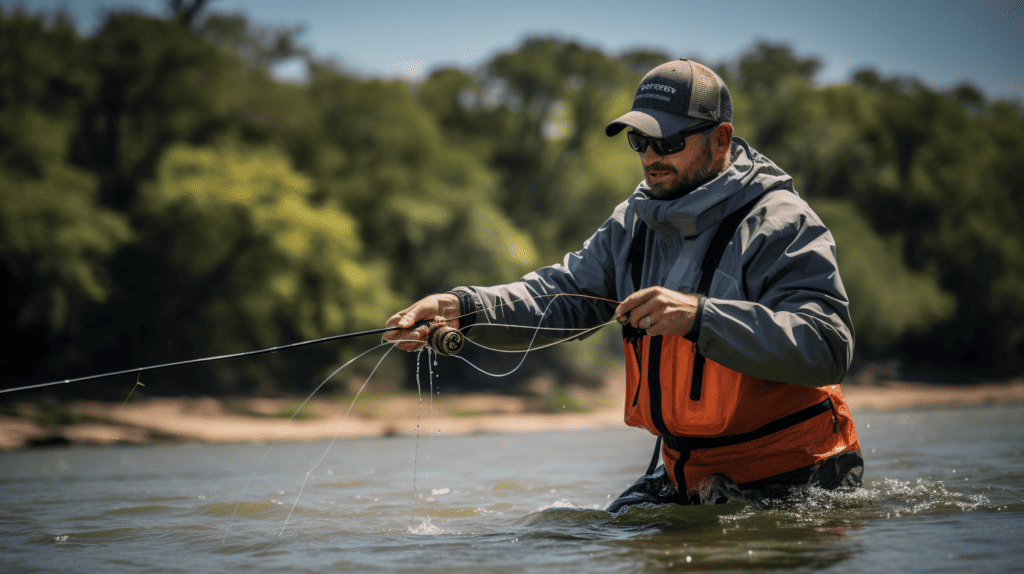
Communicate with each other
When fishing, it is important to communicate with each other. This means talking to nearby anglers and letting them know your intentions. It’s also about resolving any disagreements in a polite and respectful manner.
By communicating effectively, you can enhance the overall fishing experience for everyone involved. Remember, being considerate and kind towards others.is key in fishing etiquette.
Leave only footprints
When fishing, it’s important to be mindful of our impact on the environment. This means leaving no trace behind and taking responsibility for keeping our fishing spots clean. By practicing leave-only-footprints fishing etiquette, we can help protect the natural habitats of fish and other wildlife.
It’s essential to pick up any trash or debris, properly dispose of fishing lines, and avoid damaging vegetation. By following these eco-friendly habits, we can ensure that future generations of anglers will be able to enjoy the beauty of nature while casting their lines.
Obey the law
When it comes to fishing etiquette, one of the most important things is to obey the law. Following fishing regulations and laws is crucial for maintaining a respectful and enjoyable experience for everyone involved.
By adhering to the rules, anglers can ensure that they are engaging in lawful fishing practices and contributing to the conservation efforts in their area. It’s essential for anglers to be aware of any fishing restrictions or guidelines that apply to their specific location, as well as familiarize themselves with the fishing code of conduct.
By obeying the law, fishermen can help protect fish populations and preserve the natural environment while enjoying their favorite pastime.
Effective Tips for Fishing Etiquette and Rules Advancement
As a fishing enthusiast, I want to share with you some effective tips for improving your fishing etiquette and advancing the rules. Here are three important tips to keep in mind:
- Acknowledge Hard Work: Tipping fishing guides is an important way to show appreciation for their efforts. They work hard to ensure you have a great fishing experience, so it’s nice to acknowledge that with a tip. The suggested tip amount typically ranges between $50 and $100.
- Be Mindful of Novice Anglers: If you’re fishing with someone who is new to the sport, offer them guidance and assistance. Share information about necessary gear and teach them basic knot-tying techniques. By helping novices, we can promote a friendly and welcoming fishing community.
- Improve Your Fishing Odds: When fishing in the backseat or on crowded waters, there are ways to increase your chances of success. Try different casting angles and mix up your casts to cover more areas. These techniques can help you find the best spot and attract more fish.
Fishing Etiquette: 11 Key Rules
Respect the fish, launch and retrieve your boat efficiently, watch your wake, be quiet, and be generous to other anglers. Learn more about these essential fishing etiquette rules to enhance your fishing experience!
Respect the fish
Respecting the fish is a fundamental aspect of fishing etiquette. It means treating the fish and the fishing resource with care and consideration. To respect the fish, it’s important to handle them gently and release them properly.
This helps ensure their survival and promotes sustainable fishing practices. It’s also crucial to follow catch limits set by regulations, as exceeding these limits can harm fish populations.
Fighting a fish excessively should be avoided, as it can exhaust and injure them. By respecting the fish, we contribute to their preservation and overall well-being, promoting ethical angling and responsible fishing practices.
Launch and retrieve your boat efficiently
Launching and retrieving your boat efficiently is crucial for a smooth and stress-free fishing experience. When it comes to launching, make sure to prepare your boat beforehand. Check that everything is in working order, including the engine, lights, and safety equipment.
Back down the ramp slowly and steadily, keeping an eye out for other anglers who may be waiting their turn.
When it’s time to retrieve your boat, tie it up securely before pulling it into a launch lane. This helps prevent any accidents or damage to other boats. Remember not to block the ramp with an unattended vessel or vehicle – this can cause unnecessary delays for others trying to launch or retrieve their boats.
Watch your wake
One important rule of fishing etiquette is to watch your wake. Sending a wake, or creating waves with your boat, can be disruptive and disrespectful to other anglers on the water. It’s essential to throttle back when you’re near a boat ramp, bridge, or in a designated no-wake zone.
By being mindful of your boat’s wake effects and practicing polite navigation practices, you can contribute to a more enjoyable and considerate fishing experience for everyone involved.
So remember, always be aware of the impact your boat may have on others and make an effort to minimize any disturbances caused by excessive wake creation.
Be quiet
When fishing, it is important to be quiet. Making loud noises can scare away the fish and ruin the chance of a good catch. By being silent and avoiding unnecessary talking or yelling, you can increase your chances of success.
Remember to also minimize any noise from casting or reeling in your line. Being quiet shows respect for other anglers who are also trying to enjoy their time on the water. So, next time you’re out fishing, remember to keep a hush and let nature take its course.
Be generous to other anglers
I think it’s really important to be generous to other anglers when you’re out fishing. We should all be willing to help each other and share the water. When we cooperate and assist each other, it helps preserve the fisheries and ensure that everyone can have a great experience.
So let’s practice good fishing etiquette by being considerate, respectful, and generous towards our fellow anglers.
9 Tips on How to be a Better Fishing Charter Client
Here are some valuable tips to enhance your experience as a fishing charter client. From making a good first impression to showing appreciation with a tip, these tips will help you make the most out of your fishing adventure.
First impressions go a long way
When it comes to fishing charters, first impressions are really important. They can make a big difference in how enjoyable your experience is. That’s why it’s crucial to understand and follow fishing charter etiquette.
As a first-time charter fishing client, I believe it’s essential to communicate my skill level to the guide so they can tailor the trip accordingly. Tips like this can help maximize my enjoyment and satisfaction during the outing.
So, by creating a positive first impression and familiarizing myself with proper etiquette, I can ensure that my fishing charter experience is truly memorable.
No bananas on the boat
Bananas are believed to be bad luck on a fishing boat, especially on fishing charters. Anglers think that bananas release ethylene gas, which is said to act as a natural fish repellent.
Because of this belief, many fishing communities have banned bringing bananas on board. According to superstition, boats carrying bananas do not catch fish. It’s important to note that this ban is not supported by scientific evidence but is based on folklore and superstition related to the idea of bad luck.
So if you’re going on a fishing trip or charter, it’s best to leave the bananas at home!
Communicate your desires to the captain
Before embarking on a fishing charter trip, it is crucial to have clear communication with the captain. By discussing your desires and expectations beforehand, you can ensure that the trip meets your needs.
Sharing your preferences for target fish species, desired fishing techniques, or any specific requirements will help the captain plan accordingly. Clear communication also allows the captain to inform you about what to bring, what to expect during the trip, and any potential limitations or restrictions.
Establishing an open line of communication creates a positive relationship between you and the captain, contributing to a successful and fulfilling fishing charter experience.
Understand that fishing is not guaranteed
When going on a fishing trip, it’s important to understand that catching fish is not always guaranteed. Fishing charters cannot promise you will catch fish every time. Instead of solely focusing on the outcome, it’s essential to appreciate the experience and enjoyment that comes with fishing.
Remember, the thrill of being out on the water and spending time in nature is just as valuable as reeling in a big catch. Before booking a fishing guide or charter, make sure you have a clear idea of what you want from your trip and understand that success in fishing cannot be guaranteed.
It’s also helpful to research the guide’s website and read reviews online to get insights before making your decision.
Be mindful of your trash
One important thing to remember while fishing is to be mindful of your trash. It’s crucial to properly dispose of any waste, such as snack wrappers and used fishing line. Avoid dropping anything overboard and make sure to keep the boat clean.
Cleaning up after yourself and picking up any trash left behind not only helps maintain cleanliness on fishing charters but also prevents littering in the ocean. Taking responsibility for your personal trash ensures that you leave no trace and contribute to preserving the environment for everyone to enjoy.
So, always remember to be mindful of your trash when out on a fishing trip.
Ask about bathroom facilities
When planning a fishing charter, it’s important to ask about the bathroom facilities available on board. Some charter boats may have restroom facilities for their customers, while others may not.
It’s recommended to use the bathroom before boarding the boat to avoid any inconvenience during the trip. The availability of bathroom facilities can vary depending on the boat and its amenities, so it’s always a good idea to ask the captain or crew about the options and usage beforehand.
Keep in mind that some boats might have limited bathroom facilities, so it’s important to be mindful of their usage and conserve water when necessary.
Write reviews and share your experience
As a fishing enthusiast, it is important to write reviews and share your experiences about fishing charters. By doing so, you can help others make informed decisions when choosing a fishing trip.
Your feedback through customer reviews can also contribute to improving the overall fishing charter experience for everyone involved. It’s not only an opportunity to express gratitude to the fishing guides and crew, but also a chance to provide a comprehensive perspective by sharing both positive and negative experiences.
So don’t hesitate to write reviews and let your voice be heard in the angling community!
Remember to tip
Tipping is an important part of being a better fishing charter client. It shows gratitude for the hard work and service provided by the fishing crew. When it comes to tipping, it is recommended to follow the general rule of thumb, which is to tip around 10%-15% of the cost of the charter.
However, if you receive exceptional service and have had an outstanding fishing trip experience, tipping 20% would be appropriate. Remember, your tip should reflect both your overall satisfaction with the trip and the level of service provided by the crew.
Tipping not only helps support those who make your fishing excursion enjoyable but also promotes customer satisfaction in the service industry.
Top Fishing Safety Tips & Procedures
When it comes to fishing, safety should always be a top priority. From wearing the right gear to knowing boating techniques, these tips will help ensure a safe and enjoyable fishing experience.
Don’t miss out on these essential fishing safety guidelines! Read more.
Wear appropriate clothing and sunscreen
I always make sure to wear the right clothing and sunscreen when I go fishing. It’s important because it protects me from harmful UV radiation. To protect my skin, I use SPF30+ sunscreen and lip balm.
I also wear a hat and sunglasses to shield my face and eyes from the sun. If it’s really hot outside, I try to find some shade to stay cool. And if it’s rainy or windy, I make sure to dress appropriately with protective clothing like rain gear.
Safety is also crucial, so when I’m near or on the water, I wear a U.S. Coast Guard-approved life jacket for extra protection in case of any accidents or emergencies.
Stay hydrated
Staying hydrated while fishing is really important for your safety. Make sure to drink enough water throughout the day to keep your body hydrated. This will help prevent dehydration and heat-related illnesses, especially when you’re out in the sun for long periods of time.
So remember to bring a water bottle with you and take regular sips to stay properly hydrated. Drinking enough fluids is one of the top fishing safety tips, so don’t forget to keep yourself hydrated while enjoying your fishing adventure!
Follow proper casting and boating techniques
When it comes to fishing, it’s important to follow proper casting and boating techniques. This ensures not only your safety but also the safety of those around you. One important tip is to always look around before casting your line.
Make sure there are no other anglers nearby who could get tangled in your line. It’s also a good idea to wear shoes while fishing, as this can protect your feet from sharp objects or slippery surfaces.
When it comes to boating, make sure you know how to properly launch and retrieve your boat. This will help prevent any accidents or damage to the boat. Additionally, monitoring weather forecasts and being aware of casting on deck can ensure a safe and enjoyable fishing experience for everyone involved.
Carry necessary safety equipment
When fishing, it is crucial to carry the necessary safety equipment. This includes items like water, flashlights, maps, and a cell phone or radio. These tools can help keep you safe in case of an emergency or if you get lost while out on the water.
It’s also important to have proper rain gear, hip boots, and waders to protect yourself from adverse weather conditions. Using and storing your fishing equipment safely is essential to avoid any accidents or injuries.
And don’t forget to pack extra rain gear for those cold winter trips to stay warm and protected from the wind. Safety should always be a top priority when enjoying your fishing adventures.
Stay alert and aware of your surroundings
As a fishing enthusiast, it is crucial to stay alert and aware of your surroundings while out on the water. This means being vigilant, observant, and cognizant of everything happening around you.
Pay attention to other boats, anglers, and any potential hazards in the area. Being mindful of your surroundings ensures both your safety and the safety of others. It also helps you make informed decisions about where to cast your line or navigate your boat.
So always keep your senses sharp and stay attentive to what’s going on around you for a successful and safe fishing experience!
Importance of Fishing Etiquette and Rules
Fishing etiquette and rules play a crucial role in ensuring a positive and enjoyable experience for all anglers. By understanding and following these guidelines, we can create a respectful environment on the water that allows everyone to have a fair chance at catching fish.
One important aspect of fishing etiquette is respecting personal space. Giving ample room between yourself and fellow anglers helps prevent conflicts and allows each person to fish comfortably.
Additionally, honoring those who arrived before you by not encroaching on their chosen fishing spots demonstrates consideration for others.
Being mindful of the environment is also an essential part of fishing etiquette. Leaving no trace behind means cleaning up after ourselves, disposing of trash properly, and minimizing our impact on the natural surroundings.
This ensures that future generations can also enjoy the beauty of our waterways.
Lastly, practicing good fishing ethics is a responsibility we should all uphold. This includes following all local laws and regulations, treating fish with respect by handling them carefully, releasing undersized or protected species back into the water unharmed, and never taking more than our fair share.
By adhering to these principles of fishing etiquette and rules, we can promote harmony among anglers while preserving the integrity of our precious fisheries for years to come.
The Benefits of Practicing Good Fishing Etiquette
Practicing good fishing etiquette brings many benefits to both anglers and the environment. When we show courtesy and respect to fellow anglers, it creates a harmonious atmosphere on the water.
It allows everyone to enjoy their time without feeling crowded or disrupted. By leaving ample space between ourselves and other anglers when wading or boating, we can avoid conflicts and maintain a friendly atmosphere.
Respecting the natural resources is also crucial in practicing good fishing etiquette. This means treating fish with care, releasing them properly if they’re not intended for consumption, and following catch limits set by law.
By doing so, we ensure that future generations can continue enjoying the thrill of catching fish.
In summary, practicing good fishing etiquette promotes harmony among anglers and protects our precious waterways. It allows us all to have an enjoyable experience while respecting the fish and natural resources that make fishing possible in the first place.
The Consequences of Ignoring Fishing Etiquette
Ignoring fishing etiquette can have negative outcomes for both individuals and the overall fishing community. When anglers disregard the unwritten rules of fishing etiquette, it can lead to conflicts and tension among fishermen.
This is especially true when there is overcrowding or when someone cuts off another angler’s fishing spot, violating the first come, first served principle.
In addition to social consequences, there are also legal implications to ignoring fishing etiquette. Many bodies of water have established codes of conduct and regulations that govern how anglers should behave.
By disregarding these rules, anglers risk facing penalties or fines.
Furthermore, ignoring fishing etiquette can result in a loss of respect from fellow anglers. Showing courtesy and consideration towards others not only helps maintain a harmonious fishing environment but also preserves the enjoyment and integrity of the sport.
Observing proper spacing between fishermen, respecting those who arrived earlier, and communicating with each other are all crucial aspects of good fishing etiquette.
By practicing good fishing etiquette, we promote a sense of camaraderie and mutual respect among fishermen while ensuring that everyone has an enjoyable experience on the water. So let’s remember to be mindful of our actions and strive to follow proper fishing etiquette whenever we go out for a day on the water.
How to Educate Others on Fishing Etiquette
I think it’s important to educate others about fishing etiquette. Here are some ways to do it:
- Share your knowledge: Talk to other anglers and let them know about the rules and guidelines for respectful fishing.
- Lead by example: Show good fishing etiquette in your own behavior by following the rules and being considerate of others.
- Teach newcomers: If you see someone new to fishing, take the time to explain the etiquette and rules to them.
- Use social media: Post about fishing etiquette on social media platforms or join online fishing communities where you can share information and tips.
- Organize workshops or seminars: Arrange events where experienced anglers can teach beginners about proper fishing behavior.
- Distribute brochures or flyers: Create informational materials that outline fishing etiquette and distribute them at popular fishing spots or local bait shops.
- Support educational programs: Promote initiatives that educate people about the importance of respecting other anglers and the environment while fishing.
Conclusion on Fishing Etiquette And Rules
In conclusion, following fishing etiquette and rules is essential for a positive fishing experience. By respecting other anglers, communicating effectively, and being mindful of the environment, we can create a harmonious fishing community.
So remember to leave space for others, obey the law, be generous to fellow anglers, and practice good manners on your next fishing trip. Happy fishing!
FAQs on Fishing Etiquette And Rules
1. What is fishing etiquette?
Fishing etiquette refers to the proper behavior and manners expected from anglers when fishing, such as respecting other fishermen, following rules and regulations, and leaving the environment clean.
2. Why is fishing etiquette important?
Fishing etiquette is important because it helps create a positive and enjoyable experience for all anglers, protects the fish population and their habitat, and maintains the integrity of the sport.
3. Can you give some examples of fishing etiquette?
Examples of fishing etiquette include giving other anglers enough space, practicing catch-and-release when appropriate, keeping noise levels down near others, properly disposing of trash or waste, and respecting private property.
4. What are some rules advancements in fishing?
Rules advancements in fishing refer to changes or updates made to regulations regarding bag limits, size restrictions, closed seasons for certain species or areas – these changes aim to ensure sustainable fisheries management.
5. How can I learn more about fishing rules and etiquette specific to my area?
To learn more about specific fishing rules and etiquettes in your area,
you can visit local government websites that oversee natural resources or contact local conservation officers who can provide information regarding licenses needed,
specific waterway regulations,
and any additional guidelines you need to follow while enjoying this activity.

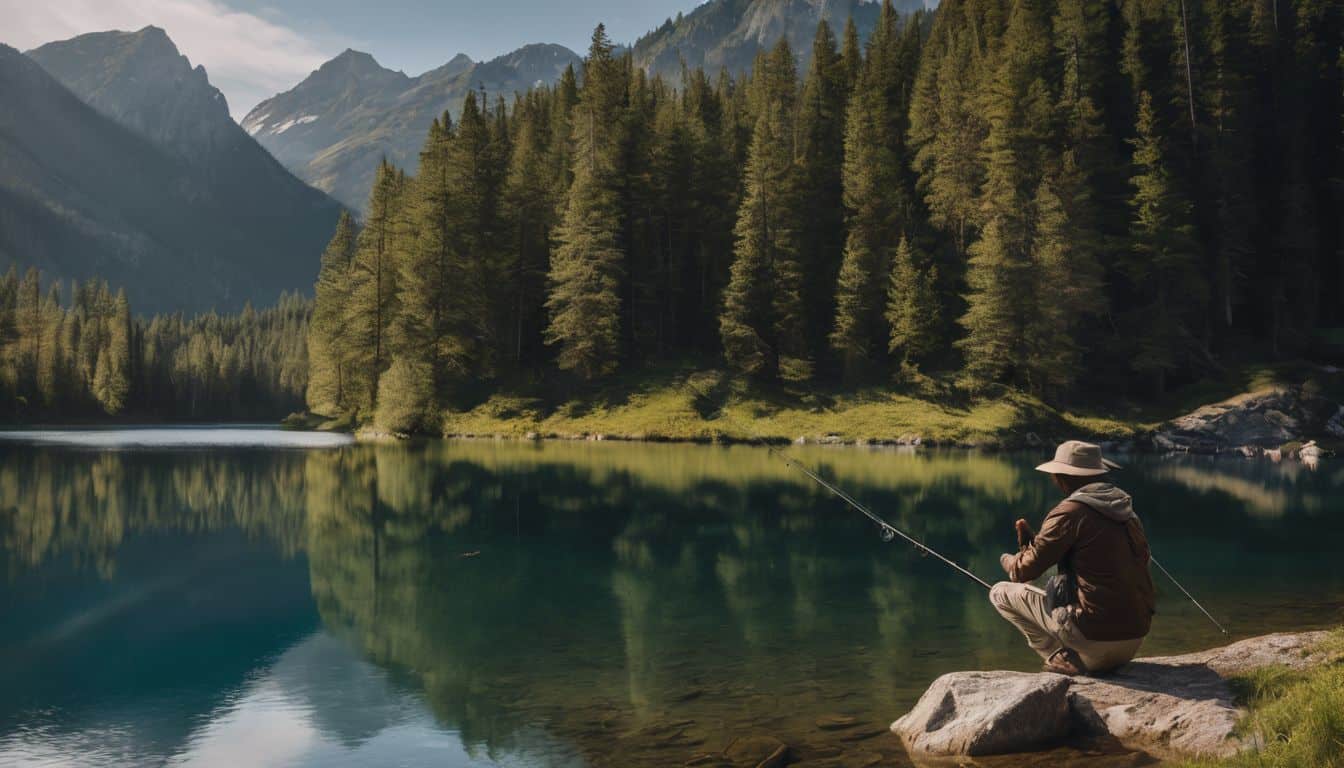
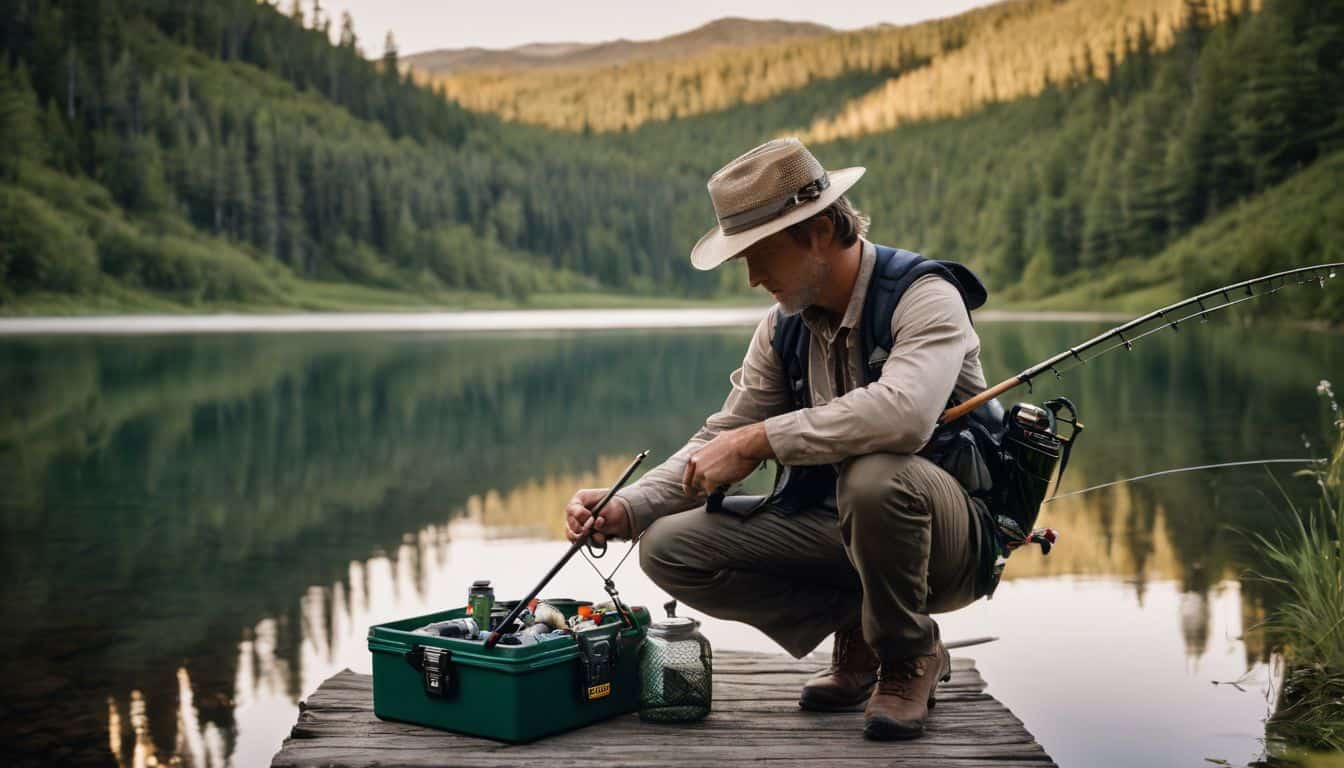
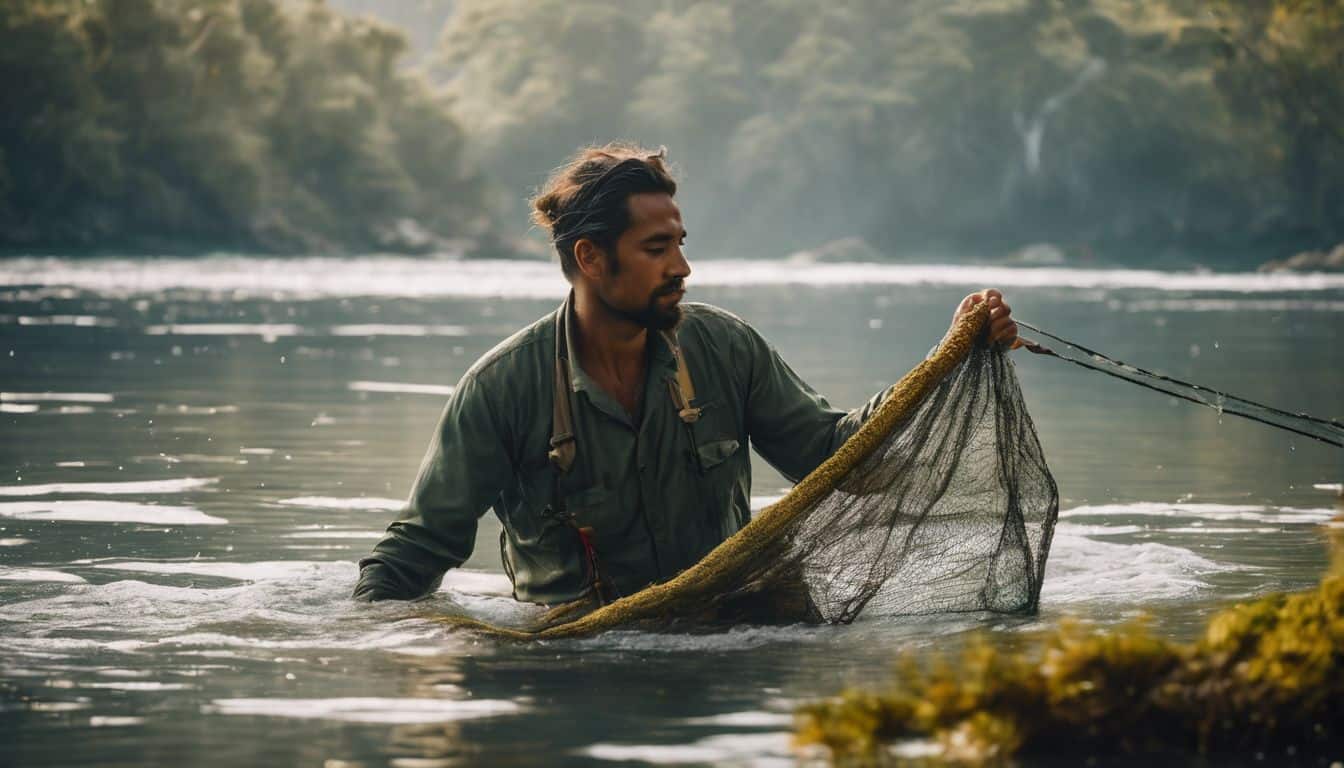
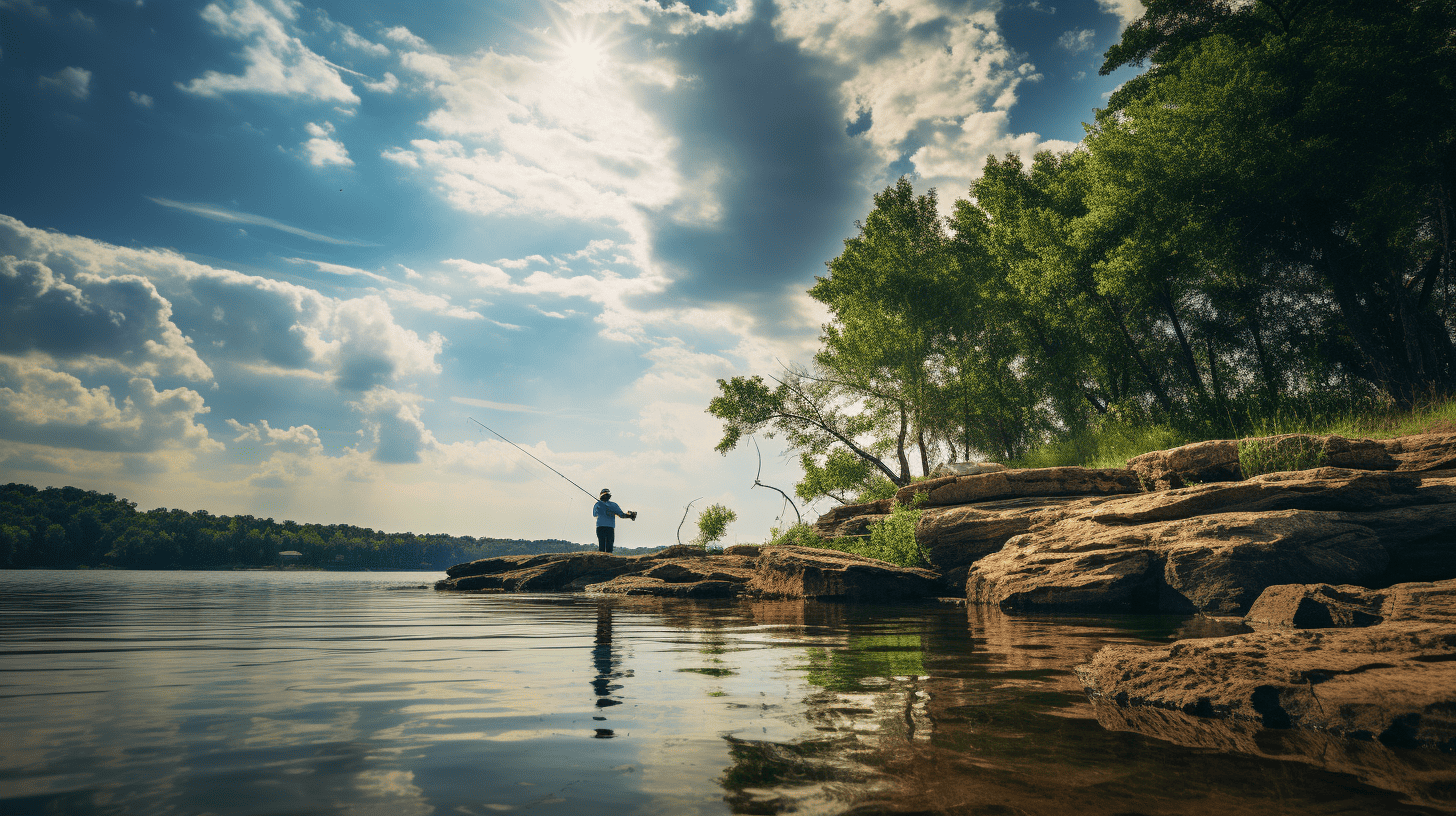
Leave a Reply